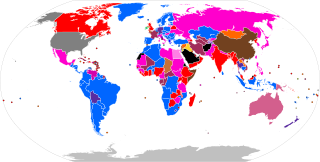 |
|---|
|
General elections were held in Jordan on 8 November 1993, [1] the first in which political parties were allowed to run since 1956. [2] [3] [4]
 |
|---|
|
General elections were held in Jordan on 8 November 1993, [1] the first in which political parties were allowed to run since 1956. [2] [3] [4]
In October 1992 political parties were legalized in Jordan for the first time since 1956. [5] [6]
The election was held using single non-transferable voting, with each voter casting one vote in multiple-member district.
A record number of voters participated in the elections, [7] with over 800,000 casting votes at around 2,900 polling stations. [7] [4]
Independents won 60 of the 80 seats, with the Islamic Action Front emerging as the largest party, winning 17 seats. Voter turnout was 55%. [1]
| Party | Votes | % | Seats | |
|---|---|---|---|---|
| Islamic Action Front | 17 | |||
| Jordanian Democratic People's Party | 1 | |||
| Jordanian Arab Socialist Ba'ath Party | 1 | |||
| Jordanian Socialist Democratic Party | 1 | |||
| Independents | 60 | |||
| Total | 80 | |||
| Total votes | 822,295 | – | ||
| Registered voters/turnout | 1,501,279 | 54.77 | ||
| Source: Nohlen et al. | ||||
Plurality voting refers to electoral systems in which a candidate who polls more than any other is elected. In systems based on single-member districts, it elects just one member per district and may also be referred to as first-past-the-post (FPTP), single-member plurality (SMP/SMDP), single-choice voting, simple plurality or relative majority. A system that elects multiple winners elected at once with the plurality rule and where each voter casts multiple X votes in a multi-seat district is referred to as plurality block voting. A semi-proportional system that elects multiple winners elected at once with the plurality rule and where each voter casts just one vote in a multi-seat district is known as single non-transferable voting.

The 1997 United Kingdom general election was held on Thursday, 1 May 1997. The governing Conservative Party led by Prime Minister John Major was defeated in a landslide by the Labour Party led by Tony Blair, achieving a 179-seat majority.
Single non-transferable vote or SNTV is an electoral system used to elect multiple winners. It is a generalization of first-past-the-post, applied to multi-member districts with each voter casting just one vote. Unlike FPTP, which is a single-winner system, in SNTV multiple winners are elected, typically in electoral districts; additionally, unlike FPTP, SNTV produces mixed representation and makes it unlikely for a single party to take all the seats in a city or a set area, which can happen under FPTP.

New Zealand is a representative democracy in which members of the unicameral New Zealand Parliament gain their seats through elections. General elections are usually held every three years; they may be held at an earlier date at the discretion of the prime minister, but that usually only happens in the event of a vote of no confidence or other exceptional circumstances. A by-election is held to fill an electorate vacancy arising during a parliamentary term. The most recent general election took place on 14 October 2023.
Vote splitting is an electoral effect in which the distribution of votes among multiple similar candidates reduces the chance of winning for any of the similar candidates, and increases the chance of winning for a dissimilar candidate. This is commonly known as the spoiler effect, which can discourage minor party candidacies.

Open list describes any variant of party-list proportional representation where voters have at least some influence on the order in which a party's candidates are elected. This is as opposed to closed list, which allows only active members, party officials, or consultants to determine the order of its candidates and gives the general voter no influence at all on the position of the candidates placed on the party list.

Elections in Chile are held nationwide, including the presidency, parliament, regional offices, and municipal positions. Chilean citizens and foreign residents with legal residency of at least five years, who are 18 years or older on election day, are eligible to vote. Previously, voting was voluntary, but since 2023, it has become compulsory.
Regular elections in Croatia are mandated by the Constitution and legislation enacted by Parliament. The presidency, Parliament, county prefects and assemblies, city and town mayors, and city and municipal councils are all elective offices. Since 1990, seven presidential elections have been held. During the same period, ten parliamentary elections were also held. In addition, there were nine nationwide local elections. Croatia has also held three elections to elect members of the European Parliament following its accession to the EU on 1 July 2013.

The single-chamber Parliament of Georgia has 150 members, elected for a four-year term through elections. The last presidential elections were held in October 2018 due to constitutional changes taking effect in 2024, after which the president will be elected for a five-year term by a parliamentary college of electors. The series of constitutional changes, initiated in 2017, stipulated a one-time transitional presidential term of six years for 2018–2024. Other major systemic changes included a move to a fully proportional system by 2024 with a 5% threshold.

The 2004 United States presidential election was the 55th quadrennial presidential election, held on Tuesday, November 2, 2004. The Republican ticket of incumbent President George W. Bush and his running mate incumbent Vice President Dick Cheney were elected to a second term, defeating the Democratic ticket of John Kerry, a United States senator from Massachusetts and his running mate John Edwards, a United States senator from North Carolina. As of 2020, this is the only presidential election since 1988 in which the Republican nominee won the popular vote and the only presidential election since 1984 in which the incumbent Republican president won re-election. Due to the higher turnout, both major party nominees set records for the most popular votes received by a major party candidate for president; both men surpassed Reagan's record from 20 years earlier. At the time, Bush's 62,040,610 votes were the most received by any nominee for president, although this record would be broken four years later by Barack Obama. Bush also became the only incumbent president to win re-election after previously losing the popular vote. He was the second sitting President in a row to win a second term. Bush won 4 states in 2004 that have not voted Republican since: Virginia, Colorado, Nevada and New Mexico. In contrast, this is the last election that the losing candidate won any of the following states: Michigan, Pennsylvania, and Wisconsin.

Bangladesh elects on national level a legislature with one house or chamber. The unicameral Jatiyo Sangshad, meaning national parliament, has 350 members of which 300 members are directly elected through a national election for a five-year term in single-seat constituencies while 50 memberships are reserved for the women who are selected by the ruling party or coalition. The Prime Minister is the head of the government. The president who is the head of the state is elected by the National Parliament. The president of Bangladesh is a ceremonial post and does not exercise any control over the running of the state.

Elections in Egypt are held for the president and a bicameral legislature. The president of Egypt is elected for a six-year term by popular vote after draft amendments to the 2013 constitution altered the presidential term limits from the original four years to six years.

Elections in Jordan are for the lower house, known as the House of Representatives, of the bicameral parliament of Jordan, as well as for local elections. They take place within a political system where the King has extensive legislative and executive powers, retaining ultimate political control. The Prime Minister is selected by the King, the PM is then free to choose his own Cabinet. The parliament has quotas: three seats for Circassians and Chechens, nine for Christians and fifteen for women. The electoral system favours rural tribes and those of East Bank origin over urban areas that are primarily inhabited by those of Palestinian descent.

Malta elects on a national level 6 MEPs representing Malta in the European Parliament, on a district level the legislature, On a local level the Local Councils and on a community level the Administrative Committees.

The New Zealand electoral system has been mixed-member proportional (MMP) since the 1996 election. MMP was introduced following a referendum in 1993. It replaced the first-past-the-post (FPP) system New Zealand had previously used for most of its history. Under MMP, New Zealanders have two secret ballot votes to elect members of Parliament (MPs). The first vote is for a candidate from an electorate, a geographic electoral district. The second is the party vote for the political party the voter wants to form the government.

An electoral system or voting system is a set of rules that determine how elections and referendums are conducted and how their results are determined. Electoral systems are used in politics to elect governments, while non-political elections may take place in business, non-profit organisations and informal organisations. These rules govern all aspects of the voting process: when elections occur, who is allowed to vote, who can stand as a candidate, how ballots are marked and cast, how the ballots are counted, how votes translate into the election outcome, limits on campaign spending, and other factors that can affect the result. Political electoral systems are defined by constitutions and electoral laws, are typically conducted by election commissions, and can use multiple types of elections for different offices.

The 2018 United States elections were held on Tuesday, November 6, 2018. These midterm elections occurred during Incumbent Republican President Donald Trump's term. Although the Republican Party increased its majority in the Senate, unified Republican control of Congress and the White House was brought to an end when the Democratic Party won control of the House of Representatives in what was widely characterized as a "blue wave" election.

Legislative elections were held in South Korea on 15 April 2020. All 300 members of the National Assembly were elected, 253 from first-past-the-post constituencies and 47 from proportional party lists. They were the first elections held under a new electoral system. The two largest parties, the liberal Democratic Party and the conservative United Future Party, set up new satellite parties to take advantage of the revised electoral system. The reforms also lowered the voting age from 19 to 18.

General elections were held in Jordan on 20 September 2016 to elect the 18th House of Representatives. The elections were announced after parliament was dissolved by King Abdullah II on 29 May 2016, with the King appointing Hani Mulki as interim Prime Minister following the resignation of Abdullah Ensour.